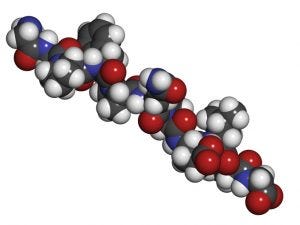
JSR Corporation has teamed with PeptiDream to develop a synthetic peptide-based affinity chromatography media that could be an alternative to costly Protein A resin.
The partnership will combine PeptiDream’s drug discovery platform, PDPS (Peptide Discovery Platform System), with JSR’s knowledge of affinity separation technology to develop affinity chromatography media from unique peptides that bind to various target proteins in a specific manner.
A peptide-based resin can be a platform for affinity purification for various types of therapeutic proteins, it could also serve as a cost-effective alternative to Protein A in the production of monoclonal antibodies (MAbs), Masayoshi Nagaya, senior global technology manager at JSR LifeSciences told this publication.

Image: iStock/Molekuul
“In today’s modern therapeutic antibody production, Protein A is used in most manufacturing processes because of its ease of use, shorter development times as well as it’s robustness and effectiveness in purifying,” Nagaya said. “Use of protein A enables higher than >95% purity of bulk drug substance with this one chromatography step.”
But while Protein A is deemed to be the gold standard for MAb capture in large-scale purification, because the ligands are made from biological processes, protein A prices accounts for a large portion of the overall raw material costs in the overall production. Therefore, finding an alternative could bring down the COGS for MAbs.
Step in peptides, and according to Nagaya such products can be designed to have specificity enabling recognition and binding to certain protein surfaces. “We can use that property to be applied for separation and recovery of target proteins.”
As peptides are synthesized in a chemical process, the cost will be significantly lower. “This cost comparison can be made for drug prices today; small molecule drugs vs. large molecule (biological) drugs.”
The length of the project between the two Japanese firms is to be determined, and financial details have not been divulged.
About the Author
You May Also Like

schedl_b_and_w.jpg?width=100&auto=webp&quality=80&disable=upscale)
schedl_b_and_w.jpg?width=400&auto=webp&quality=80&disable=upscale)


